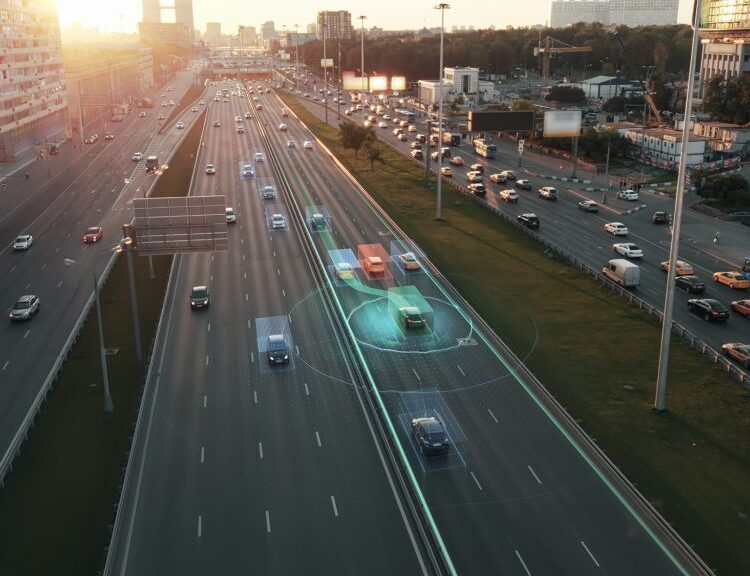EN


Picture the future. Maybe you’re seeing a place where cars float through the sky, food comes in the shape of little pills and the only color available seems to be silver. This well-known image of life in a futuristic city tends to be ingrained in our minds. But as we keep improving on our increasingly advanced technologies, a different vision is starting to take form.
It’s no secret that the car industry is in love with the idea of autonomous vehicles. And it isn’t hard to understand why – a car driving by itself feels like something straight out of science fiction. But once you consider just how much our lives revolve around our cars, the idea of autonomous vehicles expands to something much bigger than a technological achievement. It becomes something that could completely change our cities, our homes and our habits. And even though we can’t say for sure how far off these changes could be, there are those who believe the majority of all newly-produced cars will be autonomous as soon as 2040. These are five ways we believe autonomous cars would make a difference in our everyday lives.
This point might seem a little disheartening to those of us who treat our cars like a member of the family. But once self-driving cars take over, many are bound to find their garages suddenly gaping empty. With autonomous ride-sharing or taxi services available in the blink of an eye, there just won’t be any practical reason for most people to own their own car. Paying for access to a fleet of autonomous cars won’t just be considerably cheaper, but much less of a hassle.
Chances are only true car enthusiasts will own their car just for the sake of owning it. For them, driving will first and foremost be a hobby. When buying an autonomous car, the steering wheel will be sold as an optional accessory.
An obvious consequence of more people sharing fewer cars is that the total number of cars crowding urban areas will go down. But have you thought about just how much our cities are adapted to people driving cars?
Let’s start with all that parking space. A self-driving car can drop its passengers off at their destination, before seeing itself out of the city area to a more remote parking spot – where it just so happens to park itself perfectly. Parking tickets will soon join large parking garages in our memory of cities past.
And since autonomous cars can be made to be more precise in their driving than human-driven cars, the roads can be built narrower to make way for pedestrians and cyclists. With less traffic, our concrete jungles are free to become greener, cleaner places for human interaction and recreation.
Once again, fewer cars will cater to more people. And in this case, sharing is caring – about our planet. According to statistics from EPA, transports currently amount for almost 30 percent of the greenhouse gas emissions in the United States. So, cutting down on the number of cars, combined with the efficiency of autonomous cars, would no doubt reduce our carbon footprint. Add the electrification of the remaining cars, and we could really make a difference.
In another win for the environment, autonomous cars could very well replace domestic and short-haul flights. Imagine heading to the airport, going through security, check-in and boarding only to be put in a seat with minimal leg space next to a crying baby. Now imagine simply ordering an electric, overnight-car to your front door and letting it smoothly take you where you need to go while you sleep soundly in the backseat. Saving the planet suddenly got a lot easier.
Once we take driving out of the equation, the car might feel more like a second living room than a mean of transport. With the help of AI-powered interior sensing systems, the car will be able to scan and recognize the car’s occupants. Over time, it will get to know their preferences, moods and needs. And with a system determined to make your ride as comfortable and enjoyable as possible, that time-consuming commute to work could start feeling like a breeze.
Once you stop feeling like the time spent in your cars is time wasted, a long commute will feel like less of an obstacle. This will likely make people more open to settling down further away from large cities, paving the way for more vibrant rural areas and less crowding in the cities.
Of course, everything else seems a bit trivial when compared to the effects autonomous cars are predicted to have on road safety. 1.35 million people currently lose their lives to road crashes every year, and a staggering 93 percent of accidents are caused by human error. By removing the driver, we will be able to save thousands, if not millions, of lives.
But even though autonomous cars will be many times safer than human-driven cars, there is no way to completely eliminate the risk of accidents. Autonomous cars will still need effective security features, and interior sensing systems will be essential for keeping passengers safe. By inspecting the condition of the car, the system would be able to discover technical malfunctions before they cause any danger. And by scanning the positions and states of the passengers, it would guarantee that security functions are able to adapt to the situation at hand.
